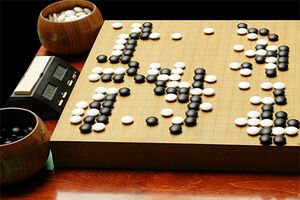Go: Difference between revisions
1d4chan>Anonykota No edit summary |
1d4chan>37 No edit summary |
||
| Line 1: | Line 1: | ||
[[Image:Go-game.jpg|thumb|right|Go: Short for "Go Fuck Yourself"]] | [[Image:Go-game.jpg|thumb|right|Go: Short for "Go Fuck Yourself"]] | ||
'''Go''' is the best game in the (known) world. It was created in the dawn of time by somebody in China. | '''Go''' is the best [[The Game|game]] in the (known) world. It was created in the dawn of time by somebody in China. | ||
===About the game=== | ===About the game=== | ||
Revision as of 21:00, 30 December 2008

Go is the best game in the (known) world. It was created in the dawn of time by somebody in China.
About the game
Go is a strategy board game involving two players, Black and White. The players take turns placing stones of their own color on the intersections of a grid; common sizes for this grid are 19x19, 13x13, and 9x9 intersections.
Stones are captured by surrounding them. A stone is surrounded when it is not possible to trace a line along the playing grid from the intersection on which the stone sits to an empty intersection, optionally passing through intersections containing stones of the same color. If, after removing captured stones, the stone just played is itself surrounded, the move is suicide and illegal in most rulesets.
To prevent certain deadlock situations, it is illegal to move such that your opponent's move is undone; otherwise the players could reach a situation in which they endlessly repeat the same two positions. In some rulesets it is illegal to recreate any previous position. A situation in which this rule applies is called ko.
If a player believes they cannot improve their position, they pass instead of placing a stone. Once both players pass, they score the game by counting the intersections surrounded by their stones, and then either adding the number of their stones still on the board, or subtracting the number of their stones captured by their opponent, depending on the ruleset.
To offset Black's advantage of moving first, White receives compensation points, typically 6.5 or 7.5 depending on ruleset. The half point is to prevent draws.
If the two players are of unmatched skill levels, White can grant Black the use of handicap stones; in effect, Black places 2 or more stones on the board as her first move, then White makes his first move. In this case the compensation points are only 0.5.